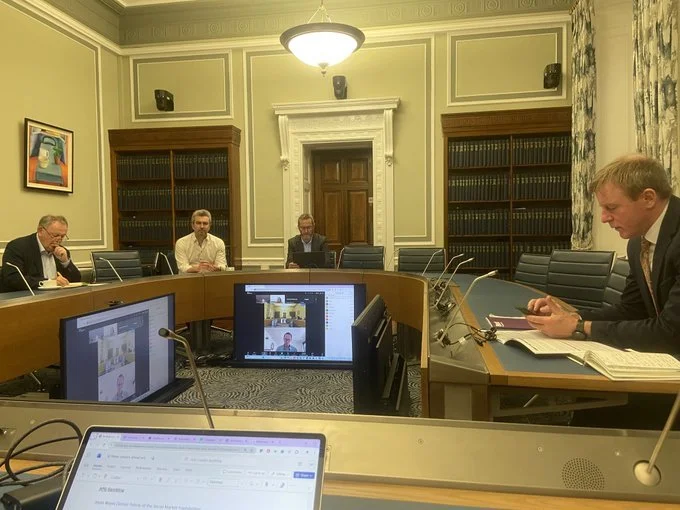APG discusses using taxation as a means of curbing harm from online gambling
On Tuesday 21 October, the All Party Group on Reducing Harm Relating to Gambling was briefed by Dr James Noyes, Senior Fellow of the Social Market Foundation (SMF), regarding the Treasury’s recent proposals to harmonise tax rates for different forms of gambling, and the case for increasing tax rates on the most harmful forms of online gambling, as outlined in the SMF report The Duty to Differentiate.
Dr Noyes explained that the Treasury’s proposals began as a tax-efficiency measure, but the conversation has since shifted towards revenue-raising. He expressed his strong confidence that the forthcoming budget will include tax increases on the gambling industry, even if not at the level proposed by the SMF, or others who have called for higher taxation, including the Institute for Public Policy Research (IPPR) and former Prime Minister Gordon Brown.
Dr Noyes outlined that the treasury proposes harmonising the current three separate tax rates - remote gaming (21%), general betting duty (15%) and the insignificant pool betting duty (15%) - into a general tax applied to all forms of gambling. Dr Noyes criticised this proposal on a number of grounds. Firstly, different gambling sectors have significantly varied economic circumstances, with products like online slots, due to their short supply chains and limited costs, providing far less to the economy than gambling pertaining to the horseracing industry, which employs thousands of people each year. Rates of harm are also different across different types of betting, with online slots deemed significantly more harmful than lower risk products like single event betting on horseracing. Gambling products are also regulated differently, leading the SMF to question why they should be taxed the same. Finally, harmonising tax rates would incentivise operators to prioritise more profitable products like online slots over other gambling products, leading to more cross-selling and advertising of the most harmful products.
Dr Noyes then explained that online gambling is undertaxed here compared to neighbouring jurisdictions. Furthermore, gambling is VAT exempt, and most of the main operators are based in tax havens (like Gibraltar and the Isle of Man) and avoid paying corporation tax.
He added that while it is difficult to estimate the fiscal costs associated with gambling-related harm, the evidence presented in the SMF report shows that the costs to the Exchequer are in excess of £1bn.
The SMF report proposes: increasing remote gaming duty (which concerns products like online slots) from 21% to 50%, increasing general betting duty (concerning sports betting, horseracing betting) from 15% to 25%, with a carve-out for the horseracing industry where gambling operators currently pay a 10% levy to ensure the sustainability of the sport. These proposals could raise £2bn in additional revenue for the Treasury.
The IPPR also endorsed these proposals, and recommended an increase in machine gaming duty (slots in land-based venues) from 25% to 50%, to harmonise tax rates for in-person and online slots. This brings the estimated revenue raised up to approximately £3bn. Dr Noyes that former Prime Minister Gordon Brown has made the case that these funds could be used to lift 500,000 children out of poverty.
Dr Noyes then briefly responded to two of the arguments against raising taxation made by the gambling industry. The first is that increasing taxes would damage the industry, causing high street stores to close, and worse odds and return-to-player for consumers. Dr Noyes noted that gambling is economically unique in a way that makes it difficult to model how tax increases would impact consumer demand. He also noted that the argument that shops are going to close due to tax increases is misleading, as many large gambling operators already have plans to close shops. The second is that increasing taxes will drive consumers to the black market. Dr Noyes explained that this is more a regulation and enforcement issue. He also said that the gambling industry had greatly exaggerated these concerns.
APG Chair Philip McGuigan MLA asked how the SMF arrived at rates of 50% on remote gaming and 25% on online betting. Dr Noyes said that the 50% rate on remote gaming is in line with the top rate of tax on land-based gambling in casinos in GB. The 25% rate of online betting is in line rate currently paid by horseracing in GB, factoring in the horseracing levy.
Phillip McGuigan then asked if efforts to increase taxation on the industry as a revenue-raising measure to tackle child poverty could dilute efforts to address gambling-related harm. Dr Noyes acknowledged that this is a real concern raised in particular by those from a public health background. However, he said that increasing taxation can be understood as a harm-reduction measure, with more tax on industry resulting in increased prices, a reduction in budget for marketing, advertising, and ‘free spins’, all making gambling less appealing to consumers. Furthermore, setting a significantly higher rate of tax for the most harmful forms of gambling, namely online slots, would reduce and might even reverse the incentive for cross-selling, leading to gambling operators investing more in products associated with lower levels of harm and which provide greater economic benefit.
Members agreed to write to the Chancellor outlining APG’s support for the SMF proposals, ahead of her Budget statement on 26 November.
